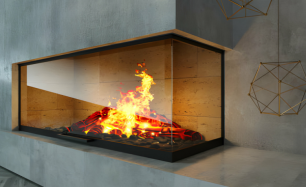Gas vs. Wood-Burning Fire Pits: Pros and Cons
Fire pits are a fantastic addition to any outdoor space, providing warmth, ambiance, and a focal point for gatherings. However, choosing between a gas and a wood-burning fire pit can be challenging. Each option has its advantages and drawbacks, depending on your lifestyle, space, and maintenance preferences. Here’s a detailed comparison to help you decide which fire pit is right for you.

Gas Fire Pits
Pros:
- Convenience – Gas fire pits ignite instantly with the push of a button, eliminating the need for kindling or fire-starting efforts.
- Low Maintenance – Unlike wood-burning fire pits, gas models do not produce ash or soot, making them easier to clean.
- Smoke-Free Experience – Gas fire pits produce a clean burn with no smoke, making them ideal for small spaces or enclosed patios.
- Safety – The controlled flame reduces the risk of stray embers or sparks.
- Modern Aesthetic – Many gas fire pits have sleek, contemporary designs that complement modern outdoor spaces.
Cons:
- Higher Initial Cost – Gas fire pits tend to be more expensive upfront due to installation and fuel setup.
- Limited Heat Output – While still warm, gas fire pits typically generate less heat than wood-burning models.
- Dependency on Fuel Supply – You need a constant supply of propane or a natural gas connection to keep the fire going.
Recommended Product from Houswise: The Fire Pit Bundle
A stylish and compact gas fire pit perfect for modern outdoor settings.

Wood-Burning Fire Pits
Pros:
- Authentic Campfire Experience – The crackling sound, natural aroma, and dancing flames create an unmatched ambiance.
- Higher Heat Output – Wood-burning fire pits produce more heat, making them better for colder climates.
- Cost-Effective – Wood is generally cheaper than propane or natural gas, especially if you have access to firewood.
- Versatile Cooking Option – You can use a wood fire pit for grilling, roasting marshmallows, or even cooking full meals with the right accessories.
Cons:
- More Maintenance – Cleaning out ash and soot after each use can be time-consuming.
- Smoke and Sparks – Wood-burning fires produce smoke, which can be bothersome and may not be ideal for enclosed areas.
- Longer Startup Time – Getting a fire started and keeping it going requires effort and proper kindling.
- Local Regulations – Some areas have restrictions on wood-burning fire pits due to environmental concerns and fire hazards.
Final Verdict: Which Fire Pit is Right for You?
- Choose a gas fire pit if you prioritize convenience, cleanliness, and a modern aesthetic.
- Choose a wood-burning fire pit if you love the traditional fire experience, need more heat, and enjoy outdoor cooking.
Whichever option you choose, a fire pit is a fantastic way to elevate your outdoor space. Explore high-quality options at Houswise to find the perfect fire pit for your needs.





